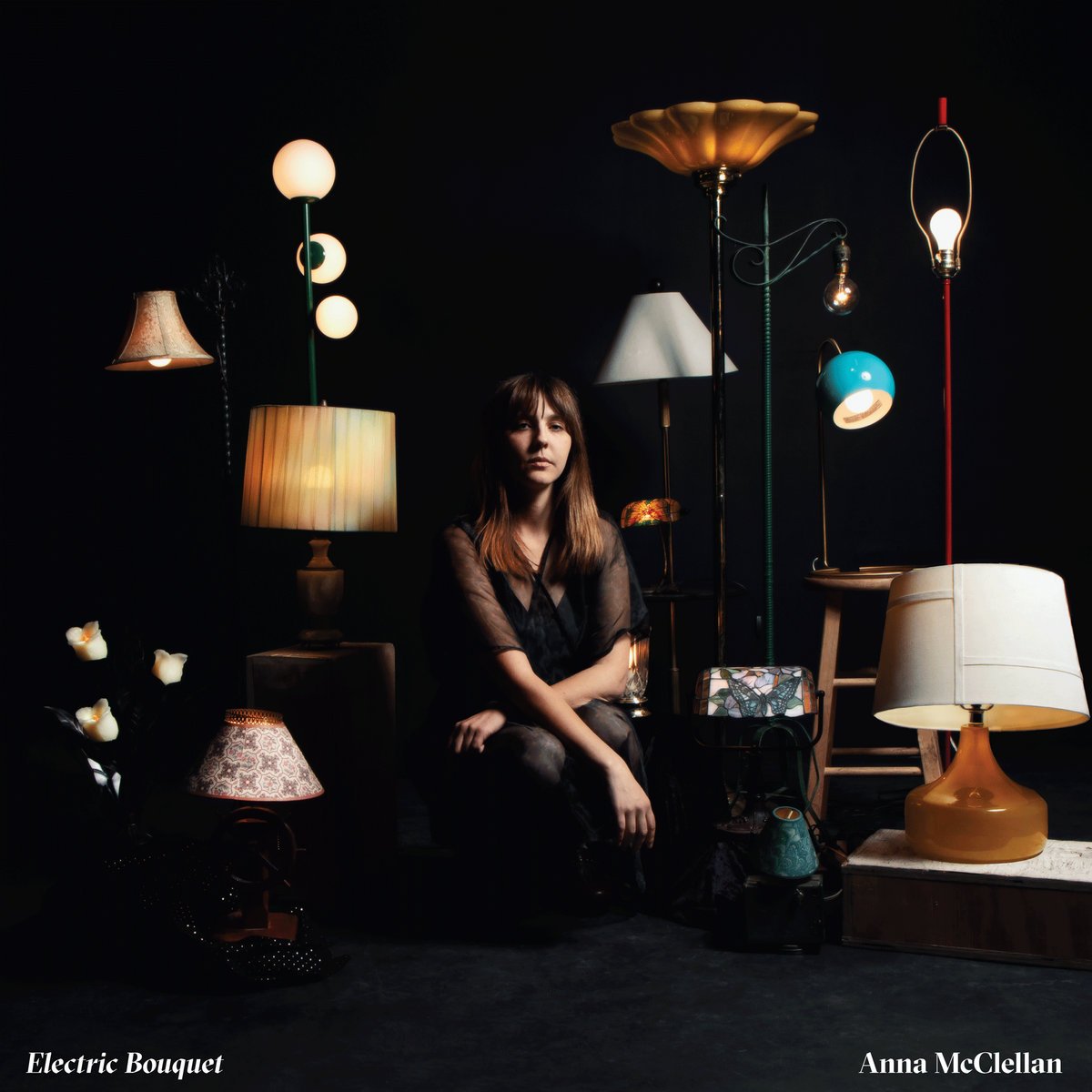by Dan Goldin (@post_trash_)
There’s an overwhelming sense woven into Anna McClellan’s songs that it’s okay not to be okay, generally followed by some sort of reminder that tomorrow is a new day, so we prattle onward. The idea isn’t so much optimistic as it is weary and understanding, together we can weather the storm, and together we just might find a way to feel okay, if only for one comfortable moment. McClellan’s word are as beautiful as her voice, drifting between a poetic awareness and abstract thought, often personified by nature - shadows, puddles, flames, fruit trees, birds - but rooted in sentiment that’s easily understood. There’s value to our feelings and we all have our share of living to do. Electric Bouquet, McClellan’s fourth album, came from a period of transition, a time spent adapting to new places, new relationships, new careers. It’s time spent ungrounded, watching the chips fall where they may, while settling into herself with a gentle focus.
Influenced by a childhood spent watching teenage TV dramas and sitcoms, there’s an episodic arc to the record’s structure, the resonant emotion of the early episodes eventually leading toward the loose comfort of the finale. The characters have been established, and with it comes noticeable growth, they know what they want and while life remains bumpy, McClellan’s world is focused on the temporary nature of it all. There’s s dawn on the other side of the darkness, and while we’re all living with anxiety in one form or another, we remain present, McClellan reminding us “the light that comes through the window takes many shapes”. The small moments can feel like major plot points. Tension gives way to laughter, both canned and genuine. Electric Bouquet is teary eyed but triumphantly resilient.
The latest “season” of Anna McClellan’s dramatic comedy with a heart of gold opens with the rolling pianos and vibraphones of “Jam The Phones,” an emotional tour-de-force built on society’s shaky ground, sweeping with grand gestures and sharp refrains, from the initial warning that “there’s no way out” to the eventual “cry your eyes out” release. It’s a beautiful sentiment of hope in hopeless times, embracing vulnerability over shutting down completely. “Endlessly” expands on those ideas, built on McClellan’s sustained piano progression, cello, electric guitar, and a breezy rhythm that comes and goes as needed. It’s a song that McClellan described as revolving around “this idea that we are each other’s truths,” putting our faith in one another when there’s nothing else to believe in.
While much of Electric Bouquet concerns itself with worldly plight, those reflections come together with personal meditations. “Paper Alley” is a great example, a song recorded in the wake of a relationship ending, the flame smothered in real time as McClellan wishes to move on, even when it feels like doing so is near impossible. “I’ve been wishing on a dream and my eyes are heavy, I don’t wanna say another thing,” McClellan sings over gentle guitars, cello, and the warm hum of electric piano, a tough realization, but a necessary step forward. The acoustic “Hold You Close” is a rumination of love and distance, the longing to be together with friends when everyone is spread across the country. The percussive and softly psychedelic “Speechless Hills” takes a surrealist route but ends upon a clear and simple request, “leave me alone, I’m chillin’”.
As introspective, sensitive, and thoughtful as it is, McClellan and her collaborators are clearly having some fun in the process, experimenting with song structures, unpredictable shifts, and McClellan’s dry sense of humor. “Like A Painting” and “I’m Lyin” provide the perfect one-two punch of these ideals, the sincerity of the songs firmly in tact while the compositions abound with radiant personality. “Like A Painting,” which was described by McClellan as three songs mashed into one, opens with a buoyant piano lead, but the road map is full of wide turns, the melancholic pop charm disrupted by skronky guitars only to sweep back into the lush soul of smooth french horn and twinkling vibraphone. “I’m Lyin,” a true stand-out, opts for a more muscular approach, bursting with guitars and caterwauling saxophone, but the magic lies in McClellan’s vocal performance, utterly gorgeous and for one quick moment, cartoonishly goofy. Like the presence of your favorite Saturday morning cartoon character, the shift to her over-the-top animated voice as she sings “I want you to love me but I turn away, can’t handle the feeling at the end of the day” is instantly endearing as she injects humor into hard truths.
It all culminates with “Dawson’s Creek,” the final episode of Electric Bouquet. An ode to growing up with the glow of the TV as a guide for life, McClellan moves from a childhood parked on the couch with “Sun Chips and Diet Coke” to her college years, getting high and “looking for love in all the wrong places”. There’s no great turn of wisdom, no sage advice on how to get the most from a life that can feel futile, but it’s the shared experience that provides comfort. We’ve all been there. The boat may be unsteady and full of holes, but we haven’t sunk yet. Anna McClellan, a truly profound songwriter, has always written with a degree of warmth amid existential crisis, and Electric Bouquet is a vibrant expansion of her music, fully aware of the chaos all around us, but offering a momentary respite.

